Are you searching for a loyal and protective pet with a striking appearance? Look no further than the long-haired German Shepherd. These breeds result from breeding between two parents with long hair, giving them a distinct look that sets them apart from their short-haired counterparts. If you’re interested in getting one of these puppies, make sure to find reputable breeders who can provide you with wonderful family companions.
Interestingly, the founder of the German Shepherd breed, von Stephanitz, disapproved of the long-haired variety and left them out of his purebred breeding program. However, over time, breeders continued to produce these beautiful coated shepherds breeds, resulting in an increase in demand for long-haired puppies.
Table of Contents
- 1 Take our Quiz. How Much Do You Actually Know About Long-Haired German Shepherds?
- 2 Characteristics and Genetics of Long-haired German Shepherds
- 3 Long-haired vs. Short-haired German Shepherds: Differences in Coat and Colors
- 3.1 Long-Haired German Shepherds Have a Longer and Thicker Coat Than Their Short-Haired Counterparts
- 3.2 The Long-Haired Variant Is Caused by a Recessive Hair Gene Inherited from Both Haired Parents
- 3.3 Long Coats Can Come In A Variety Of Colors, Including Red, And Have A Wooly Undercoat That Requires Regular Grooming
- 4 Health Issues in Long-haired German Shepherds
- 5 Owning and Caring for a Long-haired German Shepherd: Comprehensive Guide
- 5.1 Why Proper Care is Essential for a Long-haired German Shepherd’s Health and Well-being
- 5.2 Grooming: A Crucial Aspect of Maintaining a Long-haired German Shepherd’s Coat
- 5.3 Regular Care and Maintenance Can Help Extend a Long-haired German Shepherd’s Lifespan
- 5.4 As an Owner, It Is Your Responsibility to Follow the Rule of Proper Care for Your Long-Haired German Shepherd
- 6 Training and Socializing your Long-haired German Shepherd
- 7 Conclusion: All About Long-haired German Shepherds
- 8 Related posts:
- 9 German Shepherd 101: Everything You Need to Know About This Popular Breed
- 10 Unveiling the Secrets of the Black German Shepherd
- 11 German Shepherd Puppies (25 of the Cutest Pups)
- 12 Raising a German Shepherd Puppy: Everything You Need to Know
Take our Quiz. How Much Do You Actually Know About Long-Haired German Shepherds?
[SmartQuizBuilder id=20][/SmartQuizBuilder]
Long-haired German Shepherds make lovely family dogs but may be wary of strangers if not socialized from an early age. Introducing them to new people and situations while still young is essential. They can also be trained as excellent guard dogs, making them a great choice for dog owners who want a loyal and protective companion. With their intelligence and loyalty, they can also be trained as service dogs to assist those in need.
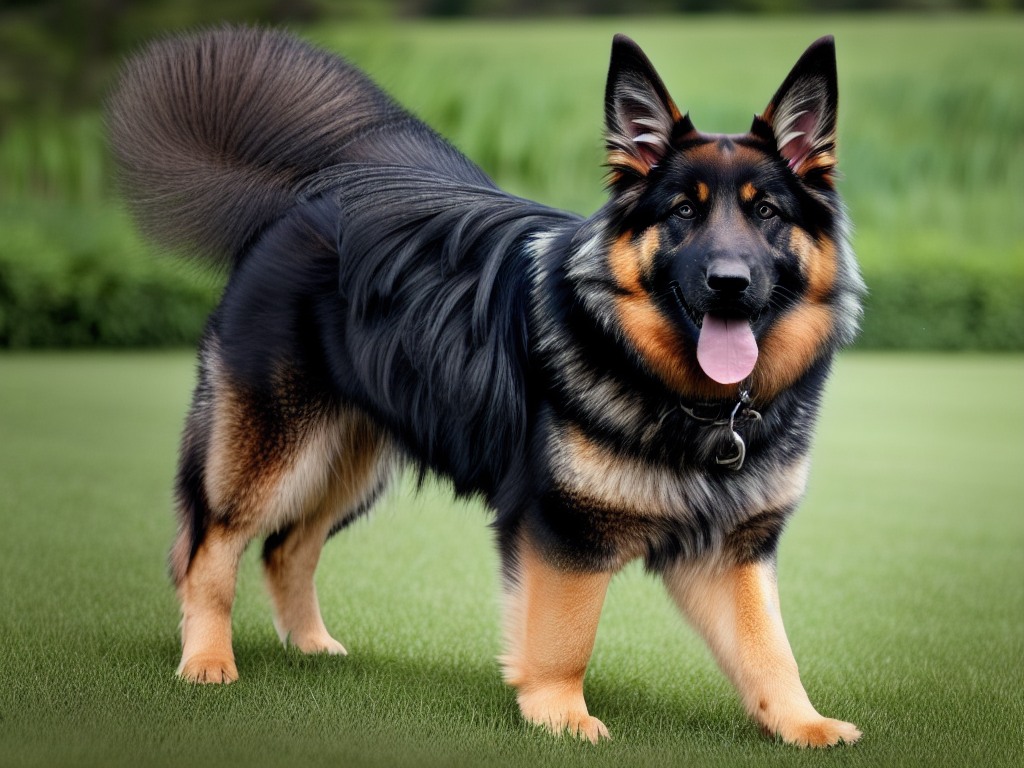
If you’re considering adding a long-haired German Shepherd to your family, remember that they require regular grooming to maintain their luxurious coat. But with proper care and attention, these loyal companions can bring joy and protection for years. German Shepherds are known for being excellent guard dogs and service dogs, making them popular among dog owners. It’s important to start grooming your puppies early on to get them used to the process.
Characteristics and Genetics of Long-haired German Shepherds
The Long Hair Gene
Long-haired German Shepherds, a popular breed of family dogs, have a recessive gene that causes their long hair. This means both parents must carry the gene to express it in their puppies. The long hair gene is not a genetic defect and does not affect the dog’s health, but it does produce a more extended, silkier coat than the standard short-haired variety with an undercoat.
Personality Traits
Long-haired German Shepherds, also known as GSDs, are a popular breed of dogs that have distinct personalities. They are loyal and protective towards their owners, making them an excellent choice for families or individuals looking for a reliable pup. These intelligent dogs are easy to train and require plenty of exercises to keep them healthy and happy. Additionally, their long undercoat requires regular grooming to maintain their appearance.
Passing Down the Gene
If both German Shepherd parents carry the long-hair gene, there is a 25% chance that each German Shepherd puppy of the breed will inherit two copies of the gene, resulting in a long-haired coat. There is also a 50% chance that each German Shepherd puppy will inherit one copy of the gene, making them carriers but not exhibiting the trait themselves. Finally, there is a 25% chance that each German Shepherd puppy will inherit no copies of the gene. It’s essential to feed your German Shepherd dogs with high-quality dog food to ensure their health and well-being.
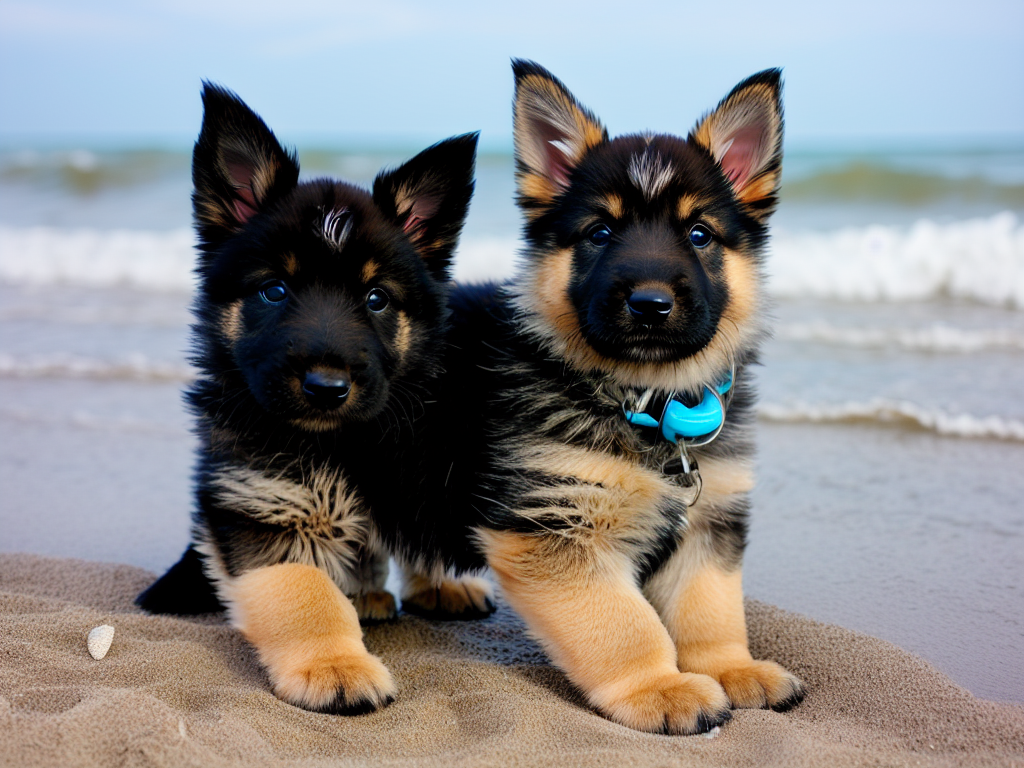
Coat Maintenance
While long-haired German Shepherds, also known as GSDs, have similar characteristics to their short-haired counterparts, their coats require more grooming. Daily brushing helps prevent matting and tangling of the fur while distributing natural oils throughout the skin to keep it healthy and shiny. Regular baths can also help keep your pup’s coat clean and free from dirt or debris, which is important for all dogs, regardless of breed.
Long-haired vs. Short-haired German Shepherds: Differences in Coat and Colors
Long-Haired German Shepherds Have a Longer and Thicker Coat Than Their Short-Haired Counterparts
One of the most apparent differences between long-haired and short-haired German Shepherds, a breed of dogs, is their coat length. As the name suggests, long-haired GSs have longer hair than their short-haired counterparts. The size of a long-coated GSD’s fur can reach up to six inches in some areas, while a short-coated pup’s fur typically measures around two inches.
Long-coated dogs, such as haired shepherds, are a breed that has a double coat comprising an outer layer of longer hair and an undercoat of soft wooly fur. This combination makes them better suited for colder climates because their thick coats provide extra insulation. If you are looking for a new furry friend, consider adopting German shepherd puppies or a German shepherd puppy with a long coat for extra warmth in winter.
The Long-Haired Variant Is Caused by a Recessive Hair Gene Inherited from Both Haired Parents
The genetic makeup of both parents determines whether or not their offspring of German Shepherd dogs will inherit the long-hair gene. If both parents carry the recessive gene responsible for the haired variant, there is a 25% chance that each puppy they produce will have this coat type. This applies to all breeds of haired shepherds.
It is essential to note that while the long-hair gene may be recessive, it does not mean it is a rare-haired variant. It merely means that it requires two copies (one from each haired parent) to express itself fully in a haired coat. This breed is known for its beautiful long-haired coat.
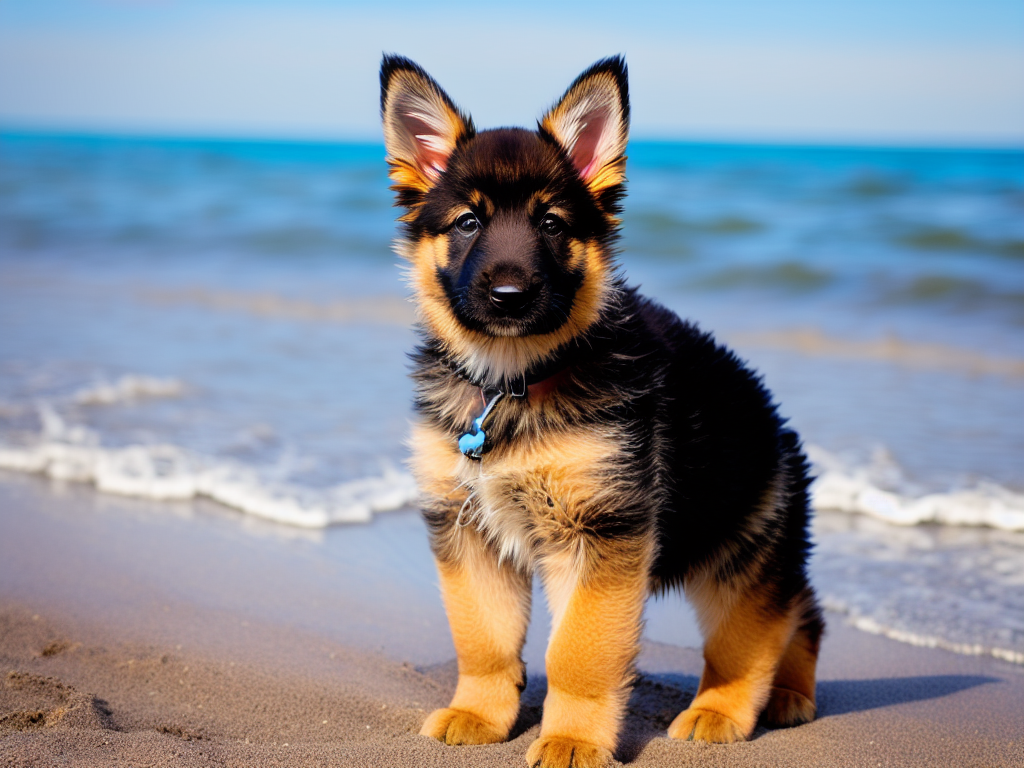
Long Coats Can Come In A Variety Of Colors, Including Red, And Have A Wooly Undercoat That Requires Regular Grooming
Long-coated German Shepherds, a haired variant of the breed, come in many colors, including black and tan, sable, solid black, and even red. However, unlike short-coated dogs, whose fur naturally sheds dirt and debris quickly, long-haired gsds’ fluffy undercoats tend to trap such particles more efficiently due to their haired gene.
Regular grooming is necessary for maintaining the health and appearance of long coats on dogs, including long haired GSDs.
Health Issues in Long-haired German Shepherds
Prone to Certain Health Issues
Long-haired German Shepherds, being a specific breed of dogs, are prone to certain health issues lcaused by factors such as dog food and allergies. These health problems can affect the quality of life of gsds and cause discomfort. Common health issues in long-haired German Shepherds include hip dysplasia, arthritis, and ear infections.
Hip dysplasia is a genetic condition affecting dogs’ hip joints, including the black long-haired German Shepherds breed. It causes pain, limping, and difficulty in walking. Arthritis is another joint-related problem that can affect gsds as they age. It causes inflammation and stiffness in the joints.
Allergies are also common among dogs of the German Shepherd breed, commonly known as GSDs. They can be caused by food or environmental factors such as pollen or dust mites. Allergies can lead to skin irritation, itching, and hair loss in GSDs.
Ear infections are another issue that affects long-haired German Shepherds dogs due to their floppy ears, which trap moisture and debris inside the ear canal. This creates a breeding ground for bacteria and yeast, leading to painful ear infections in dogs.
Genetic Health Issues
Some health issues in long-haired German Shepherds are genetic, making them common among dogs of this breed. This means that they are inherited from their parents or ancestors. Examples of gene health conditions include hip dysplasia, degenerative myelopathy (a condition that affects the spinal cord), von Willebrand’s disease (a bleeding disorder), and pancreatitis (inflammation of the pancreas).
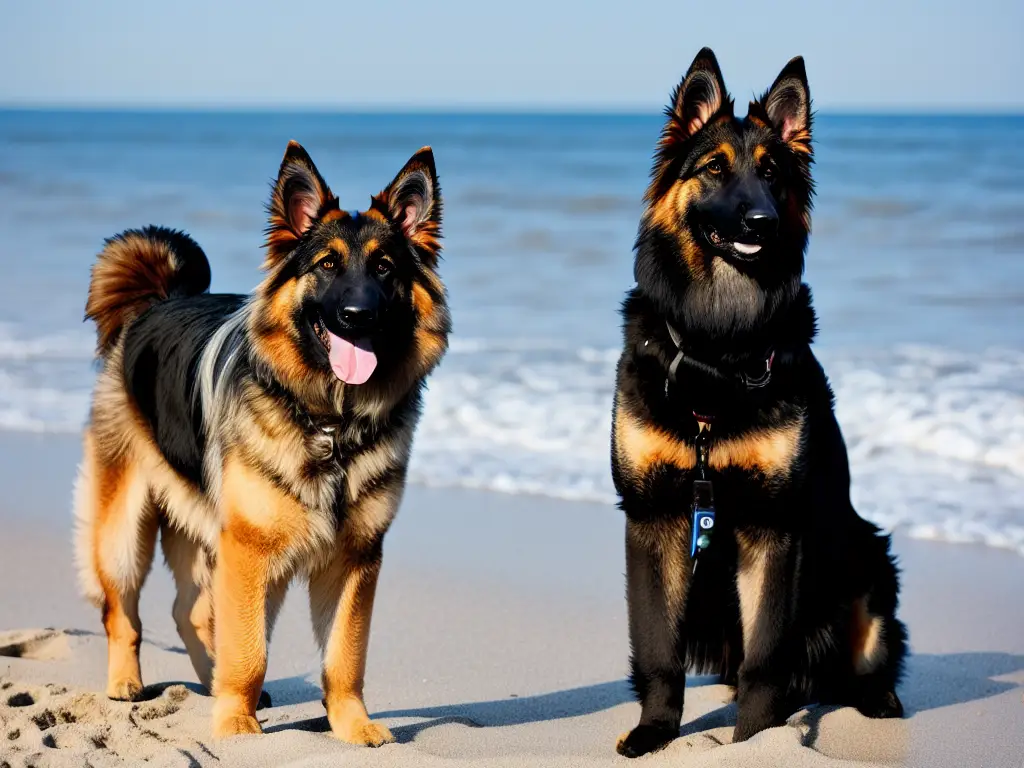
It is essential to get your long-haired German Shepherd dogs from a reputable breeder who conducts proper health screenings on both parents before breeding them.
Behavioral Issues Due to Health Problems
Health problems in long-haired German Shepherds dogs can lead to behavioral issues such as aggression and anxiety. For example, if your dogs suffer from chronic pain due to arthritis or hip dysplasia, they may become irritable or aggressive when touched or handled.
Owning and Caring for a Long-haired German Shepherd: Comprehensive Guide
Why Proper Care is Essential for a Long-haired German Shepherd’s Health and Well-being
Long-haired German Shepherds are beautiful dogs with thick, luxurious coats that require proper care. Failure to maintain their coat can lead to matting, skin irritations, and other health issues. As an owner, you are responsible for providing your long-haired German Shepherd with the care they need.
Grooming: A Crucial Aspect of Maintaining a Long-haired German Shepherd’s Coat
Grooming is one of the most crucial aspects of caring for dogs with long hair, such as the German Shepherd. Daily brushing helps remove loose hair, dirt, and debris from their coat while preventing matting. Bathing should be done every few months or as needed, using dog-specific shampoo to avoid skin irritation.
Trimming their nails regularly is also essential for dogs with long hair or a haired coat, including haired shepherds, to prevent painful overgrowth and potential injuries. Finally, cleaning their ears weekly can help prevent ear infections in all dogs, regardless of their coat type.
Regular Care and Maintenance Can Help Extend a Long-haired German Shepherd’s Lifespan
Proper care keeps your long-haired German Shepherd dogs looking tremendous and can extend their lifespan. Regular exercise is vital for keeping dogs healthy both physically and mentally. A well-balanced diet that meets dogs’ nutritional needs will help keep them in top shape.
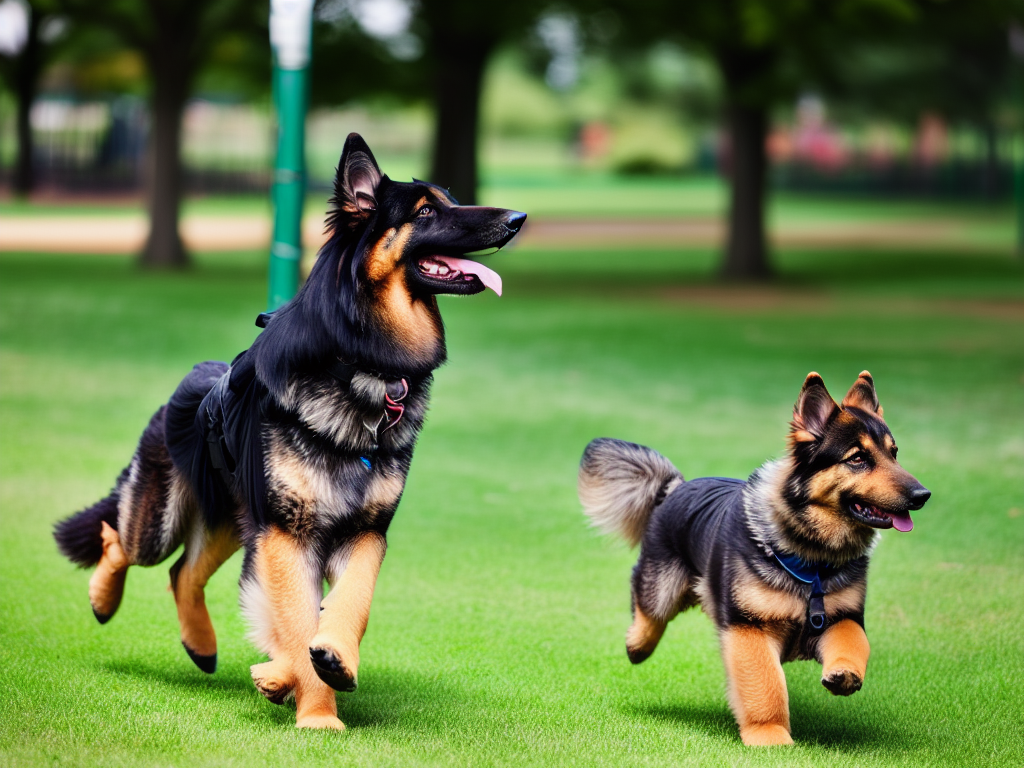
Regular veterinary check-ups are also essential for catching any potential health issues early on before they become more severe, especially for dogs like the long coat German Shepherds and haired Shepherds.
As an Owner, It Is Your Responsibility to Follow the Rule of Proper Care for Your Long-Haired German Shepherd
Owning a long-haired German Shepherd dog requires dedication and commitment to providing proper care. Neglecting their grooming needs or failing to provide adequate exercise or nutrition can lead to serious health problems for the dog down the line.
As a dog owner, it is crucial to educate yourself on the specific needs of your long-haired German Shepherd breed dog and take steps to ensure they receive the care they require.
Training and Socializing your Long-haired German Shepherd
Professional Dog Trainer
One of the most important things you can do for your long-haired German Shepherd (GSD) is to hire a professional dog trainer. A professional dog trainer can help you train and socialize your GSD from an early age, which will make a huge difference in their behavior as they grow older. A well-trained GSD can be a great guard, therapy, or service dog with proper training.
Exercise and Mental Stimulation
Long-haired German Shepherds are active dogs that require regular exercise and mental stimulation. Regularly taking your GSD to the dog park is an excellent way to provide them with both. At the park, they can run around and play with other dogs while also getting the mental stimulation they need by exploring new environments.
Regular Grooming
Maintaining your long-haired German Shepherd dog’s coat requires regular grooming, including brushing. Brushing your GSD dog’s coat daily will help prevent excessive shedding and keep their fur healthy and shiny. It would be best to bathe your GSD dog every few months to keep their coat clean.
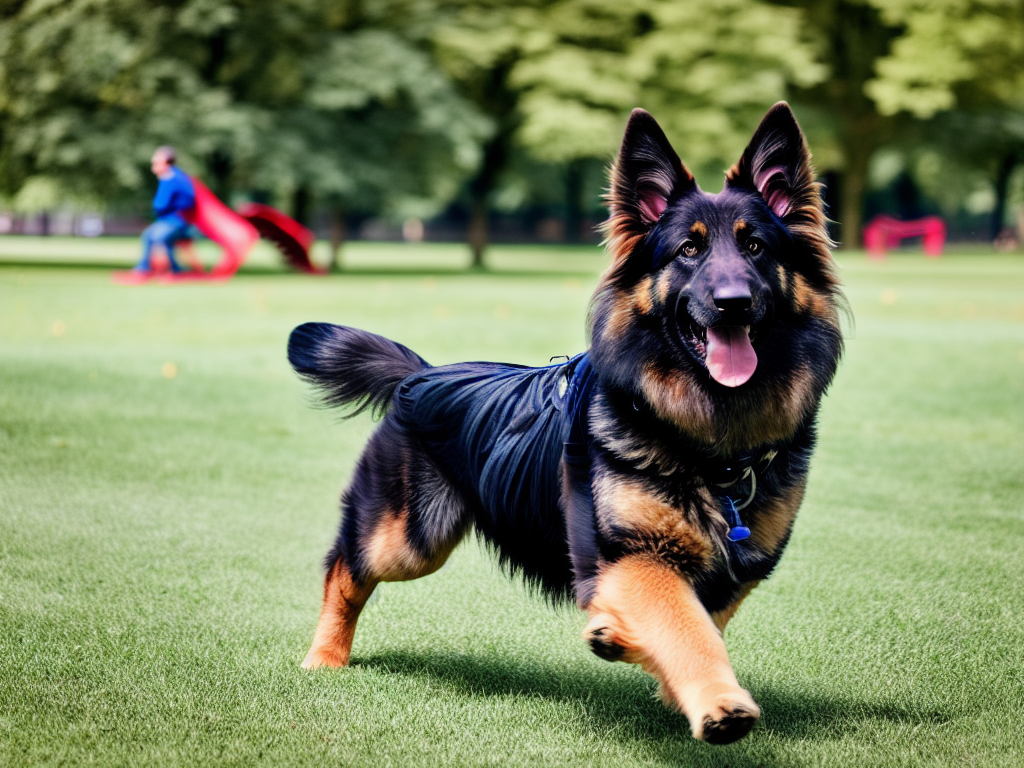
Diet
A healthy diet is essential for any dog, but it’s necessary for long-haired German Shepherds. Ensure you’re feeding them high-quality dog food that meets all their nutritional needs. Consult a veterinarian about what food is best for your pup.
Shelter Adoption vs. Breeders
When considering adopting a long-haired German Shepherd dog, you have two options: adopting from a shelter or buying from a breeder. Adopting a sanctuary dog saves a life and helps reduce overpopulation in shelters. However, buying from a reputable breeder may be the better option if you’re looking for specific traits or characteristics in your GSD dog.
Breeding Your Long-Haired German Shepherd
If you decide to breed your long-haired German Shepherd dog, it’s essential to do so responsibly.
Conclusion: All About Long-haired German Shepherds
In conclusion, long-haired German Shepherds are a beautiful and unique breed that requires specific care and attention. Understanding their characteristics and genetics is essential for potential owners to ensure they can provide the necessary care for these dogs. It’s also important to note the differences in coat and color between long-haired and short-haired German Shepherds.
Owners must be aware of health issues that may arise in long-haired German Shepherds, such as hip dysplasia or skin conditions, and take preventative measures to keep their dogs healthy. Owning a long-haired German Shepherd requires a comprehensive guide for proper care, including grooming techniques and dietary needs.
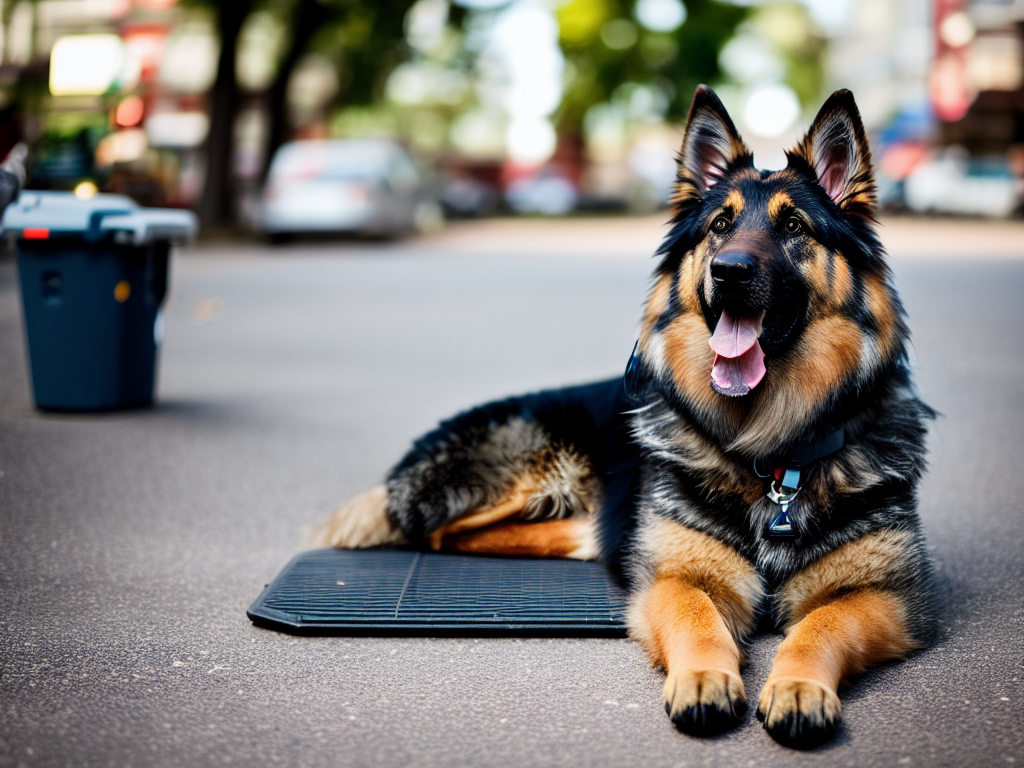
Training and socializing your long-haired German Shepherd is crucial for their overall well-being. These dogs are intelligent and loyal but need proper training to behave appropriately around other animals and people.
If you’re considering getting a long-haired German Shepherd, it’s essential to understand the responsibility of owning one. These dogs require time, effort, and patience from their owners. However, owning a long-haired German Shepherd can be incredibly rewarding if you’re willing to put in the work; owning a long-haired German Shepherd can be an enriching experience.
FAQs
Are long-haired German Shepherds hypoallergenic?
No, German Shepherds, including long coat and long haired GSDs, are not hypoallergenic. They still shed like other breeds of dogs.
What is the average lifespan of a long-haired German Shepherd?
The average lifespan of a long-haired German Shepherd dog is 10-13 years.
Do all long-haired German Shepherds have black coats?
No, the long coat haired German Shepherd dog can come in various colors, such as sable or black and tan.
How often should I groom my long-haired German Shepherd?
You should groom your haired GSD at least once a week to prevent the matting and tangling of their fur.